 Tìm kiếm
Tìm kiếm
Chương VI Luật Nghĩa vụ quân sự 2015: Chế độ, chính sách và ngân sách bảo đảm trong việc thực hiện nghĩa vụ quân sự
| Số hiệu: | 78/2015/QH13 | Loại văn bản: | Luật |
| Nơi ban hành: | Quốc hội | Người ký: | Nguyễn Sinh Hùng |
| Ngày ban hành: | 19/06/2015 | Ngày hiệu lực: | 01/01/2016 |
| Ngày công báo: | 26/07/2015 | Số công báo: | Từ số 863 đến số 864 |
| Lĩnh vực: | Bộ máy hành chính, Quyền dân sự | Tình trạng: | Còn hiệu lực |
TÓM TẮT VĂN BẢN
Văn bản tiếng việt
Văn bản tiếng anh
1. Công dân đang làm việc tại cơ quan, tổ chức trong thời gian thực hiện đăng ký nghĩa vụ quân sự, khám, kiểm tra sức khỏe nghĩa vụ quân sự thì được trả nguyên lương, tiền tàu xe và các khoản phụ cấp hiện hưởng.
2. Công dân đến đăng ký nghĩa vụ quân sự, khám, kiểm tra sức khỏe được bảo đảm chế độ ăn, ở trong thời gian thực hiện đăng ký, khám, kiểm tra sức khỏe, tiền tàu xe đi, về.
3. Chính phủ quy định chi tiết Điều này.
1. Đối với hạ sĩ quan, binh sĩ trong thời gian phục vụ tại ngũ:
a) Được bảo đảm cung cấp kịp thời, đủ số lượng, đúng chất lượng về lương thực, thực phẩm, quân trang, thuốc phòng bệnh, chữa bệnh; được bảo đảm chỗ ở, phụ cấp hàng tháng, nhu yếu phẩm và nhu cầu về văn hóa, tinh thần phù hợp với tính chất nhiệm vụ của quân đội; được bảo đảm chế độ trong các ngày lễ, tết; được bảo đảm chăm sóc sức khỏe khi bị thương, bị ốm đau, bị tai nạn theo quy định của pháp luật;
b) Từ tháng thứ mười ba trở đi được nghỉ phép theo chế độ; các trường hợp nghỉ vì lý do đột xuất khác do Bộ trưởng Bộ Quốc phòng quy định;
c) Từ tháng thứ hai mươi lăm trở đi được hưởng thêm 250% phụ cấp quân hàm hiện hưởng hàng tháng;
d) Được tính nhân khẩu trong gia đình khi gia đình được giao hoặc điều chỉnh diện tích nhà ở, đất xây dựng nhà ở và đất canh tác;
đ) Được tính thời gian phục vụ tại ngũ vào thời gian công tác;
e) Được ưu đãi về bưu phí;
g) Có thành tích trong chiến đấu, công tác, huấn luyện được khen thưởng theo quy định của pháp luật;
h) Trong trường hợp bị thương, bị bệnh khi làm nhiệm vụ thi được hưởng chế độ ưu đãi theo quy định của pháp luật;
i) Được Nhà nước bảo đảm chế độ bảo hiểm xã hội, bảo hiểm y tế theo quy định của Luật bảo hiểm xã hội, Luật bảo hiểm y tế;
k) Được tạm hoãn trả và không tính lãi suất khoản vay từ Ngân hàng chính sách xã hội mà trước khi nhập ngũ là thành viên hộ nghèo, học sinh, sinh viên theo quy định của pháp luật;
l) Được ưu tiên trong tuyển sinh quân sự.
2. Đối với thân nhân hạ sĩ quan, binh sĩ tại ngũ:
a) Bố, mẹ đẻ; bố, mẹ vợ hoặc bố, mẹ chồng; người nuôi dưỡng hợp pháp; vợ hoặc chồng; con đẻ, con nuôi hợp pháp của hạ sĩ quan, binh sĩ tại ngũ được hưởng chế độ bảo hiểm y tế theo quy định của Luật bảo hiểm y tế, được hưởng trợ cấp khó khăn do ngân sách nhà nước bảo đảm;
b) Con đẻ, con nuôi hợp pháp của hạ sĩ quan, binh sĩ tại ngũ được miễn, giảm học phí khi học tại cơ sở giáo dục phổ thông công lập và ngoài công lập theo quy định của pháp luật về chế độ miễn, giảm học phí;
c) Trường hợp hạ sĩ quan, binh sĩ tại ngũ hy sinh, từ trần trong khi làm nhiệm vụ thì gia đình được hưởng chế độ ưu đãi theo quy định của pháp luật.
3. Đối với hạ sĩ quan, binh sĩ khi xuất ngũ:
a) Được cấp tiền tàu xe, phụ cấp đi đường, trợ cấp xuất ngũ;
b) Trước khi nhập ngũ đang học tập hoặc có giấy gọi vào học tập tại các trường thuộc cơ sở giáo dục nghề nghiệp, cơ sở giáo dục đại học thì được bảo lưu kết quả, được tiếp nhận vào học ở các trường đó;
d) Trước khi nhập ngũ đang làm việc tại cơ quan nhà nước, tổ chức chính trị, tổ chức chính trị - xã hội thì khi xuất ngũ cơ quan, tổ chức đó phải có trách nhiệm tiếp nhận lại, bố trí việc làm và bảo đảm thu nhập không thấp hơn trước khi nhập ngũ; trường hợp cơ quan, tổ chức đó đã giải thể thì cơ quan, tổ chức cấp trên trực tiếp có trách nhiệm bố trí việc làm phù hợp;
đ) Trước khi nhập ngũ đang làm việc tại tổ chức kinh tế thi khi xuất ngũ tổ chức đó phải có trách nhiệm tiếp nhận lại, bố trí việc làm và bảo đảm tiền lương, tiền công tương xứng với vị trí việc làm và tiền lương, tiền công trước khi nhập ngũ; trường hợp tổ chức kinh tế đã chấm dứt hoạt động, giải thể hoặc phá sản thì việc giải quyết chế độ, chính sách đối với hạ sĩ quan, binh sĩ xuất ngũ được thực hiện như đối với người lao động của tổ chức kinh tế đó theo quy định của pháp luật;
e) Được giải quyết quyền lợi về bảo hiểm xã hội theo quy định của Luật bảo hiểm xã hội;
g) Đối với hạ sĩ quan, binh sĩ xuất ngũ theo quy định tại khoản 1 Điều 43 và khoản 1 Điều 48 của Luật này, khi về địa phương được chính quyền các cấp, cơ quan, tổ chức ưu tiên sắp xếp việc làm và cộng điểm trong tuyển sinh, tuyển dụng công chức, viên chức; trong thời gian tập sự được hưởng 100% mức lương và phụ cấp của ngạch tuyển dụng tương ứng với trình độ đào tạo.
4. Chính phủ quy định chi tiết Điều này.
Hạ sĩ quan, binh sĩ dự bị trong thời gian tập trung huấn luyện, diễn tập, kiểm tra sẵn sàng động viên, sẵn sàng chiến đấu thì bản thân và gia đình được hưởng chế độ chính sách theo quy định của Chính phủ.
Trường hợp bị thương, bị bệnh hoặc từ trần trong khi làm nhiệm vụ thì bản thân và gia đình được hưởng chế độ ưu đãi theo quy định của pháp luật.
Ủy ban nhân dân các cấp, cơ quan, tổ chức trong phạm vi chức năng, quyền hạn có trách nhiệm thực hiện chế độ, chính sách đối với gia đình hạ sĩ quan, binh sĩ tại ngũ và hạ sĩ quan, binh sĩ dự bị.
1. Ngân sách trung ương bảo đảm kinh phí cho việc thực hiện nghĩa vụ quân sự của bộ, cơ quan trung ương.
2. Ngân sách địa phương bảo đảm kinh phí cho việc thực hiện nghĩa vụ quân sự của cơ quan, tổ chức, đơn vị của địa phương.
3. Kinh phí cho việc thực hiện nghĩa vụ quân sự của doanh nghiệp, tổ chức khác do doanh nghiệp, tổ chức đó tự bảo đảm.
4. Chính phủ quy định chi tiết Điều này.
POLICIES AND FUNDING FOR PERFORMANCE OF MILITARY SERVICE
Article 49. Policies for citizens during the time of registration for military service, medical examination
1. Any citizen who is working at an office/organization shall have salary and allowances unchanged during the registration for military service or pre-enlistment medical check-up.
2. Any citizen who register for military service or undergo pre-enlistment medical check-up shall be ensured food and accommodation during the registration/check-up and the travel expenses.
3. The Government shall provide details and guidance on this Article.
Article 50. Policies for active duty non-commissioned officers/enlisted soldiers, demobilized non-commissioned officers/enlisted soldiers and their family
1. Regarding non-commissioned officers/enlisted soldiers during service in regular armed forces:
a) Provided promptly and sufficiently with conformable food, military equipment, medicine; provided with accommodation, monthly allowances, necessaries and cultural and spiritual needs according to characteristic and tasks of service; provided with incentives in holidays; provided with medical care according to the laws;
b) From the 13th month, active duty non-commissioned officers/enlisted soldiers may apply for leave under the regime; other irregular absence shall be regulated by the Minister of National Defense;
c) From the 25th month, active duty non-commissioned officers/enlisted soldiers may receive 250% of current monthly rank allowances;
d) Counted as a member of family when his/her family is allocated or adjusted an area of housing, residential land and/or farmland;
dd) Having the time duration on active duty included in working period of time;
e) Provided with preferential postage;
g) Provided with awards for good performance in combat, service or practice according to the law provisions;
h) Any active duty non-commissioned officers/enlisted soldiers who is injured or ill during the duty shall receive preferential regime according to the law provisions;
i) Covered by social insurance and medical insurance according to the Law on social insurance and the Law on medical insurance;
k) Any active duty non-commissioned officers/enlisted soldiers being members of disadvantaged households or students that receives loans from Vietnam Bank for Social Policies shall received a postponement of payment without interest according to the law provisions;
l) Provided with incentives in military enrollment.
2. Regarding relatives of active duty non-commissioned officers/enlisted soldiers:
a) Parents; parents in law; legal fosterers; wife or husband; children, legal adopted children of active duty non-commissioned officers/enlisted soldiers may have the benefits of medical insurance policyholders according to the regulations in the Law on medical insurance and have the difficulty subsidies funded from the state budget;
b) Children, legal adopted children of active duty non-commissioned officers/enlisted soldiers may get exemption from tuition fee when learning at public or non-public compulsory education institutions according to the law provisions on tuition fee exemption;
c) Regarding active duty non-commissioned officers/enlisted soldiers who die when carrying out their duty, their family may be provided with incentives according to the law provisions.
3. Regarding demobilized non-commissioned officers/soldiers:
a) Provided with fares and allowances for travel, demobilization allowance;
b) People who were studying at schools affiliated to vocational education institutions or higher education institutions before enlistment shall have the study results reserved and may continue their study at such schools;
c) Having preference when finding jobs;
d) Before the enlistment, if a person was working at a regulatory agency, political organization or a socio-political organization, then when he/she is demobilized, such agency/organization shall arrange him/her the job with earnings not lower than those of the one before they enlisted; if such agency/organization has been dissolved, the direct superior shall arrange appropriate job for him/her;
dd) Before the enlistment, if a person was working at an economic organization, then when he/she is demobilized, such organization shall arrange him/her the job with earnings not lower than those of the one before they enlisted; if such organization has been shutdown, dissolved or bankrupt, such person shall be handled according to the policies applicable to other employees;
e) Having benefits from social insurance according to the provisions of Law on social insurance;
g) Non-commissioned officers/enlisted soldiers that are demobilized according to the regulations in clause 1 Article 43 and clause 1 Article 48 of this Law who come back to their local areas shall get preferences in finding jobs and enrollment and recruitment of officials and civil servants; such people shall get 100% of salary and allowances of the recruitment rank in proportion to their training level.
4. The Government shall provide details and guidance for this Article.
Article 51. Policies for reserve non-commissioned officers/enlisted soldiers
If a reserve non-commissioned officer/enlisted soldier is ready for mobilization/fighting during the concentrated training/practicing, himself/herself and his/her family shall get incentives according to the regulations of the Government.
Regarding active duty non-commissioned officers/enlisted soldiers who are injured, ill or die when carrying out their duty, they themselves and their family may be provided with incentives according to the law provisions.
Article 52. Responsibilities of relevant agencies/organizations in the implementation of policies for families of non-commissioned officers/enlisted soldiers
People’s Committees at all levels and relevant agencies/organizations within their functions and power shall implement the policies applicable to families active duty non-commissioned officers/enlisted soldiers and reserve non-commissioned officers/enlisted soldiers/
Article 53. Fundings for assurance of performance of military service
1. The state budget shall cover the expenditure of performance of military service of Ministries and central agencies.
2. The local budget shall cover the expenditure of performance of military service of local agencies, organizations and units.
3. Expenditure of performance of military service of other enterprises/organizations shall be paid by such enterprises/organizations themselves.
4. The Government shall provide details and guidance for this Article.
Văn bản liên quan
Cập nhật
Bài viết liên quan
Thông báo tuyển chọn công dân thực hiện nghĩa vụ công an 2025 tại Hà Nội
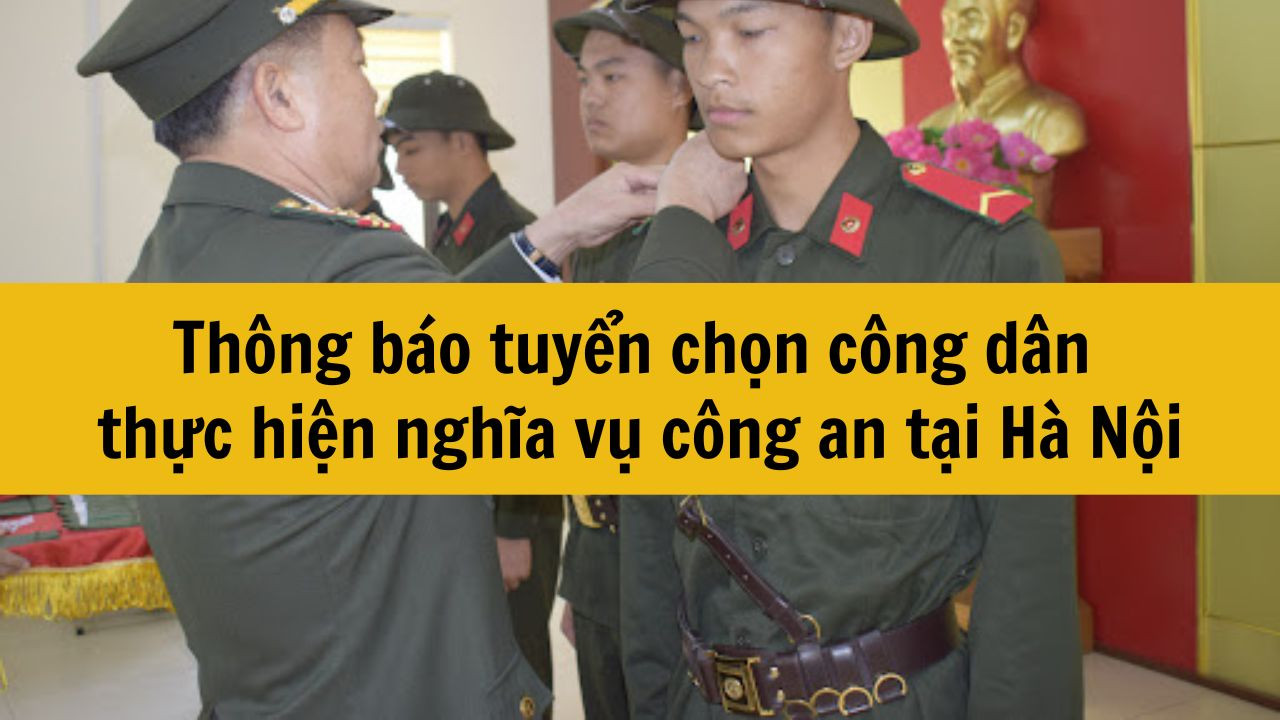
Thông báo tuyển chọn công dân thực hiện nghĩa vụ công an 2025 tại Hà Nội
Thông báo tuyển chọn công dân thực hiện nghĩa vụ công an 2025 tại Hà Nội theo Chỉ thị 10/CT-UBND của Ủy ban Nhân dân Thành phố Hà Nội ngày 27 tháng 09 năm 2024. 02/01/2025Đi nghĩa vụ công an 3 năm là có đúng quy định pháp luật không?

Đi nghĩa vụ công an 3 năm là có đúng quy định pháp luật không?
Thời gian tham gia nghĩa vụ công an là một trong những thắc mắc phổ biến của các bạn trẻ khi chuẩn bị thực hiện nghĩa vụ bảo vệ Tổ quốc. Thông thường, thời gian đi nghĩa vụ công an là 24 tháng (2 năm), song vẫn có những trường hợp ngoại lệ theo quy định. Vậy việc tham gia nghĩa vụ công an trong 3 năm có phù hợp với quy định pháp luật không? Bài viết dưới đây sẽ cung cấp thông tin chi tiết, dựa trên các quy định hiện hành để giúp bạn hiểu rõ hơn về vấn đề này. 02/01/2025Rớt nghĩa vụ công an có phải đi nghĩa vụ quân sự không?
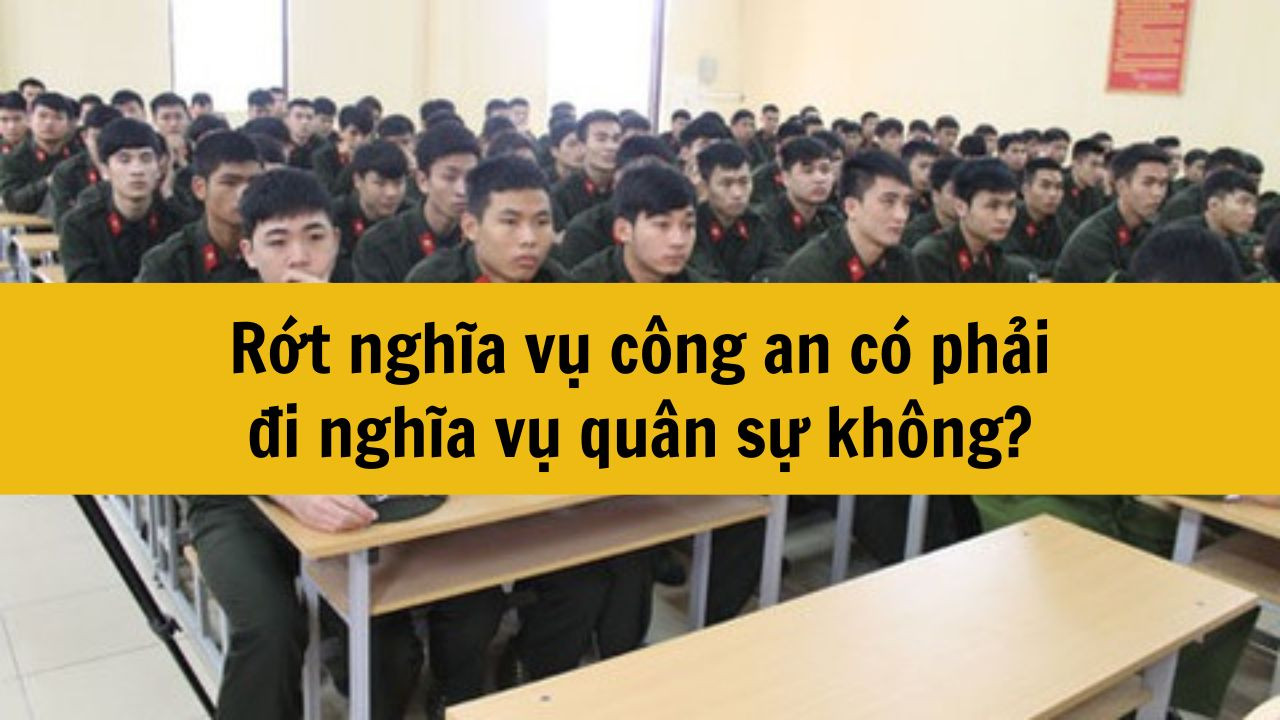
Rớt nghĩa vụ công an có phải đi nghĩa vụ quân sự không?
Nghĩa vụ công an và nghĩa vụ quân sự đều là hai hình thức thực hiện nghĩa vụ bảo vệ Tổ quốc theo quy định pháp luật Việt Nam. Tuy nhiên, không ít người thắc mắc rằng, nếu không trúng tuyển nghĩa vụ công an, liệu có bắt buộc phải tham gia nghĩa vụ quân sự hay không? 02/01/2025Đi nghĩa vụ công an có được vào biên chế không?
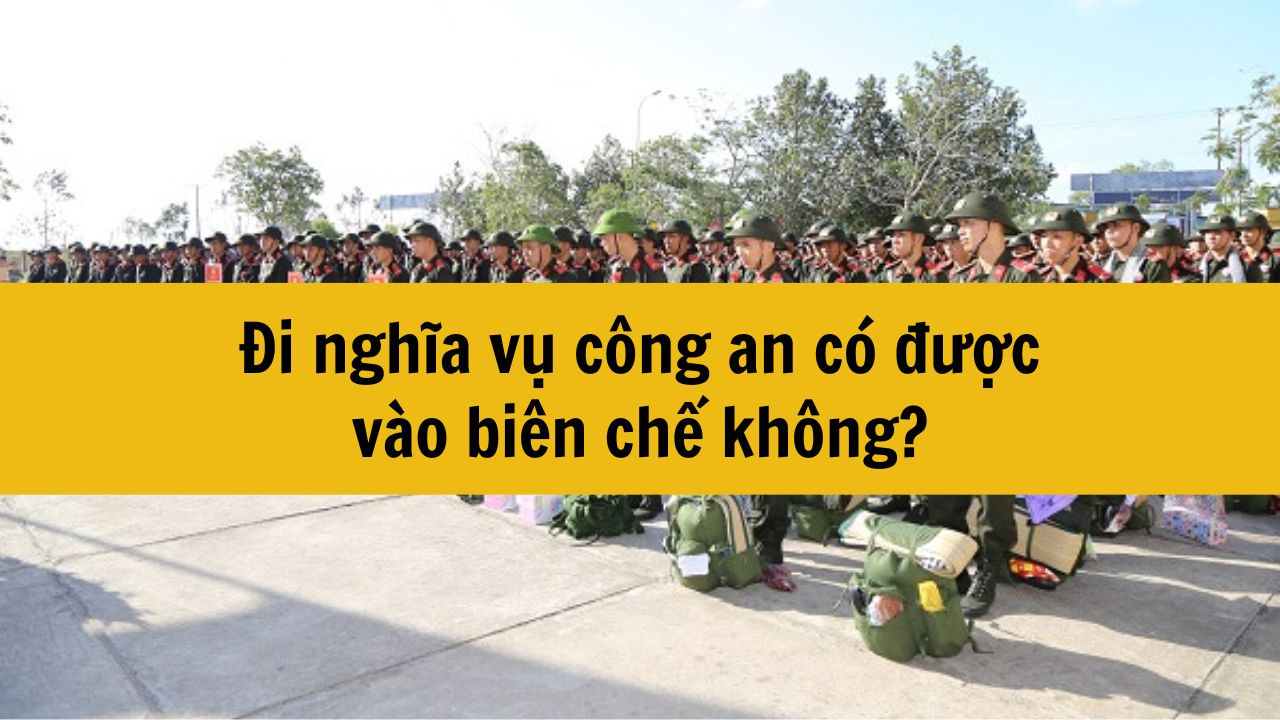
Đi nghĩa vụ công an có được vào biên chế không?
Đi nghĩa vụ công an có được vào biên chế không? Đây là câu hỏi mà nhiều bạn trẻ và gia đình quan tâm khi cân nhắc tham gia nghĩa vụ trong lực lượng Công an nhân dân. Thực tế, việc tham gia nghĩa vụ công an không chỉ là trách nhiệm với đất nước mà còn là cơ hội để nhiều người phát triển sự nghiệp trong ngành. Tuy nhiên, việc có được vào biên chế sau khi hoàn thành nghĩa vụ công an hay không phụ thuộc vào nhiều yếu tố, từ chính sách tuyển dụng đến năng lực và kết quả công tác của từng cá nhân. Hãy cùng tìm hiểu rõ hơn về vấn đề này qua bài viết dưới đây. 19/11/2024Đi nghĩa vụ công an phải khám sức khỏe mấy lần?

Đi nghĩa vụ công an phải khám sức khỏe mấy lần?
Khám sức khỏe là bước quan trọng trong quy trình tuyển chọn nghĩa vụ công an, giúp đảm bảo rằng người tham gia có đủ thể lực và sức khỏe để đáp ứng yêu cầu của công việc. Tuy nhiên, nhiều người thắc mắc. "Đi nghĩa vụ công an phải khám sức khỏe mấy lần?" Đây là câu hỏi phổ biến, bởi quy trình này không chỉ đơn giản mà còn được thực hiện qua nhiều giai đoạn nhằm sàng lọc kỹ lưỡng. Trong bài viết này, chúng ta sẽ tìm hiểu chi tiết về số lần khám sức khỏe, các bước cụ thể trong quy trình, cũng như những điều cần lưu ý để chuẩn bị tốt nhất. 19/11/2024Bị cận có đi nghĩa vụ công an được không?

Bị cận có đi nghĩa vụ công an được không?
Tham gia nghĩa vụ công an là mong muốn của nhiều bạn trẻ, nhưng không phải ai cũng đủ điều kiện để thực hiện nguyện vọng này. Một trong những câu hỏi thường gặp là liệu những người bị cận thị có thể đăng ký tham gia nghĩa vụ công an hay không. Vấn đề này liên quan đến các tiêu chuẩn sức khỏe được quy định rõ ràng trong ngành, nhằm đảm bảo rằng lực lượng công an luôn đáp ứng được yêu cầu nhiệm vụ. Vậy theo các tiêu chuẩn hiện nay, bị cận có đi nghĩa vụ công an được không? 19/11/2024Đi nghĩa vụ công an có xét lý lịch 3 đời không?
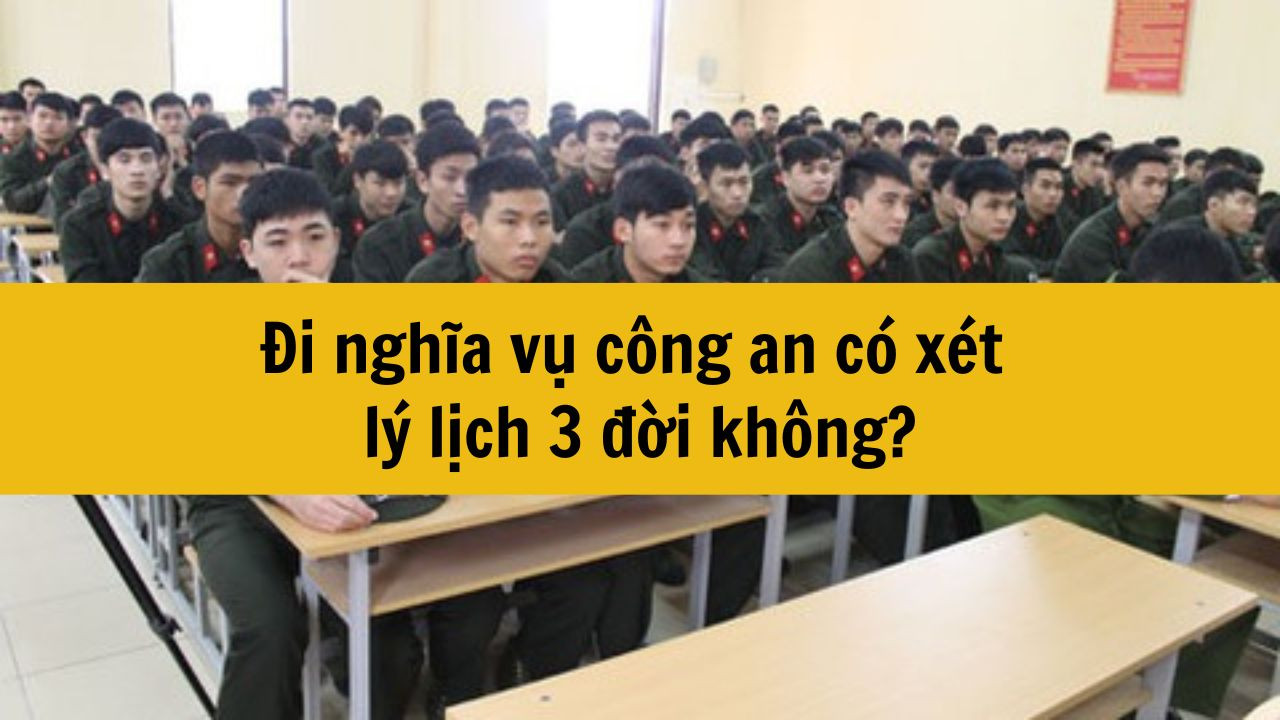
Đi nghĩa vụ công an có xét lý lịch 3 đời không?
Việc tham gia nghĩa vụ công an luôn nhận được sự quan tâm lớn từ nhiều bạn trẻ và gia đình, đặc biệt là về các tiêu chí xét tuyển. Một trong những thắc mắc phổ biến nhất là liệu khi đi nghĩa vụ công an có cần xét lý lịch 3 đời hay không. Đây là vấn đề nhạy cảm, liên quan đến các quy định pháp luật và yêu cầu đặc thù của ngành công an, đòi hỏi sự rõ ràng và minh bạch trong cách hiểu và áp dụng. 02/01/2025Đi nghĩa vụ công an có được đóng BHXH không?
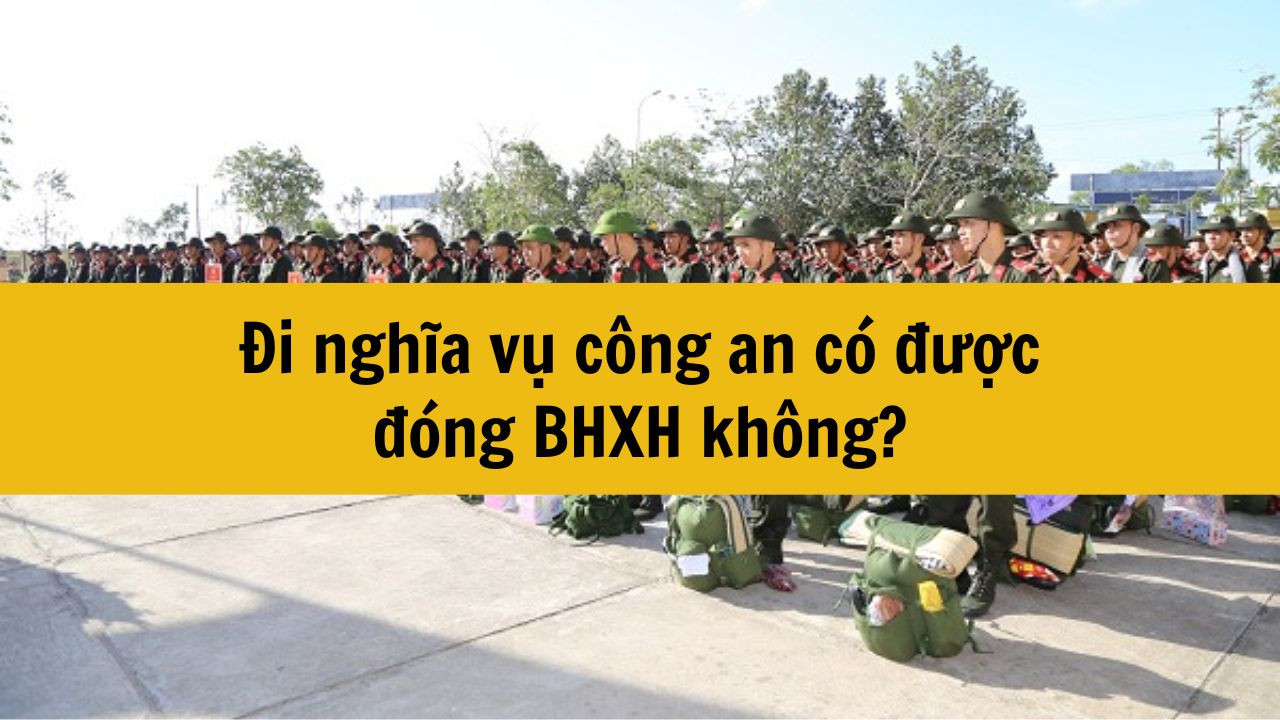
Đi nghĩa vụ công an có được đóng BHXH không?
Một trong những thắc mắc phổ biến của các bạn trẻ trước khi tham gia nghĩa vụ công an là liệu quá trình này có được tính đóng bảo hiểm xã hội (BHXH) hay không. Đây là một vấn đề quan trọng, bởi thời gian tham gia nghĩa vụ không chỉ là cống hiến cho đất nước mà còn ảnh hưởng đến các quyền lợi dài hạn như hưu trí hoặc trợ cấp sau này. Trong bài viết này, chúng ta sẽ tìm hiểu cụ thể về chính sách BHXH áp dụng cho người đi nghĩa vụ công an theo quy định mới nhất. 02/01/2025Quyền lợi khi đi nghĩa vụ công an mới nhất 2025
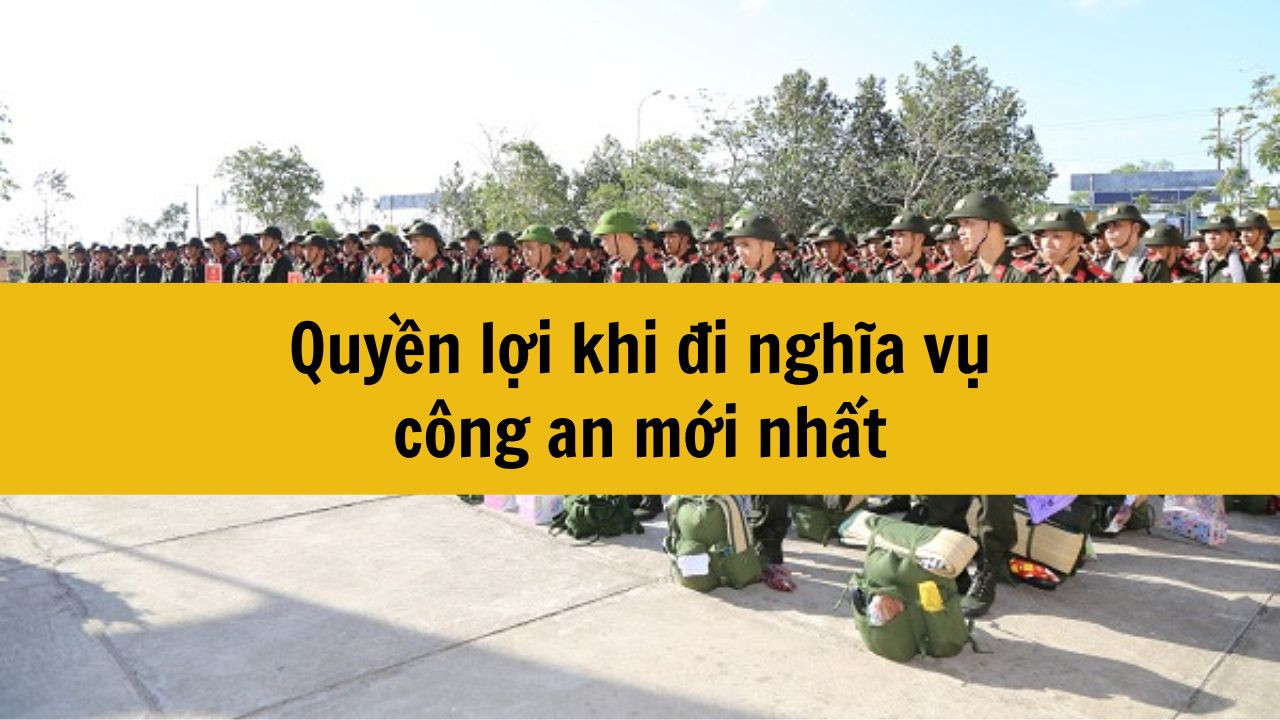
Quyền lợi khi đi nghĩa vụ công an mới nhất 2025
Đi nghĩa vụ công an không chỉ là trách nhiệm với Tổ quốc mà còn mang lại nhiều quyền lợi hấp dẫn dành cho công dân. Năm 2025, các chính sách mới về nghĩa vụ công an được cập nhật nhằm bảo đảm quyền lợi, hỗ trợ và khích lệ những người tham gia như chế độ lương, phụ cấp, đến cơ hội nghề nghiệp sau khi hoàn thành nhiệm vụ. 02/01/2025Đi nghĩa vụ công an nên mang theo gì? Đi nghĩa vụ công an có được mang điện thoại không?
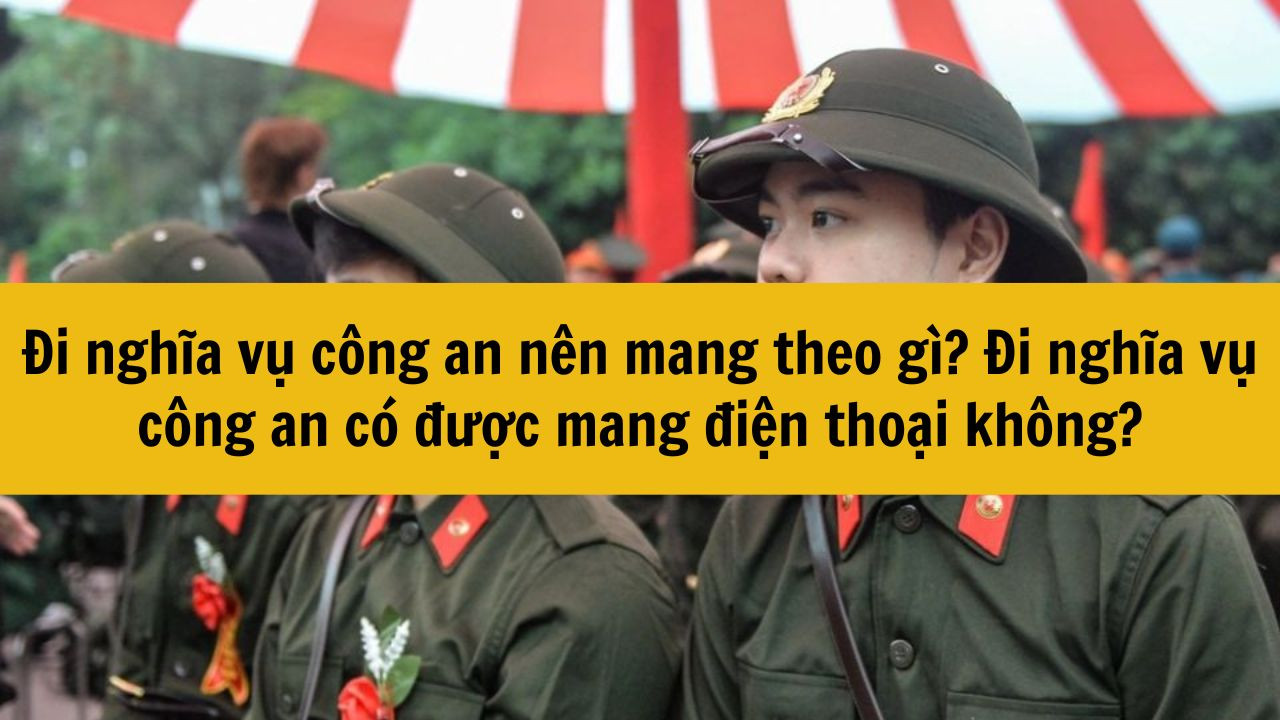

 Luật Nghĩa vụ quân sự 2015 (Bản Word)
Luật Nghĩa vụ quân sự 2015 (Bản Word)
 Luật Nghĩa vụ quân sự 2015 (Bản Pdf)
Luật Nghĩa vụ quân sự 2015 (Bản Pdf)